Education
Endocrinology & Metabolism Fellowship Program
 Residency and Fellowship Programs at UVA
Residency and Fellowship Programs at UVA
We aim to match one fellow into the 3y research track, and two fellows into the 2y clinical track this year. We participate in the NRMP match and adhere to the Association of Program Directors in Endocrinology/Metabolism All-In-Match policy.
First-year fellowship positions for the 2026-2027 academic year:
- Applications should be submitted online through ERAS; fellowship programs will have access to ERAS applications on July 16, 2025.
- Our fellowship participates in Program Signaling. While we preferentially review applications from those who signal our program, we also consider other factors in an applicant’s portfolio in making a decision on extending an interview invitation.
- Interview invitations will be extended starting in July/Aug and will continue through Sep/Oct (in accordance w/AAMC, AAIM, and APDEM guidelines, all interviews will be virtual this year)
- Priority for the 3y research track is given to applicants with a strong interest/potential in academic research (3y research track fellows must be US citizens or permanent residents to allow for eligibility for NIH training grants).
- We do accept J-1 visas for our 2y clinical fellowship.
Submit the following application documentation through ERAS:
- Curriculum vitae
- Personal statement
- Dean’s letter (MSPE) and original transcript
- Three letters of recommendation (one must be from the applicant’s internal medicine residency program director)
- U.S. Medical Licensing Exam (USMLE) exam scores
- For foreign medical graduates: certification from the Educational Commission for Foreign Medical Graduates (ECFMG)
Overview
The Endocrinology/Metabolism Training Program provides intensive clinical training (and research training, if applicable) for physicians who have completed a residency in internal medicine. The program fulfills the requirements for subspecialty certification in Endocrinology and Metabolism by the American Board of Internal Medicine (ABIM); for full details regarding subspecialty board eligibility, please see the ABIM’s website.
Our primary objective is to train outstanding physicians who will be well-prepared to succeed in a broad range of professional careers: academic investigators, clinician-educators, or pure clinicians. We offer a flexible training program that can be tailored to an applicant’s interests and long-term goals, with two main tracks available:
Three-year research track
This encompasses a three-year training experience combining clinical training with intensive research experience; this track is best suited for those primarily interested in an academic research career. During the first year of training, the fellows have an in-depth clinical experience where 80% of their effort is devoted to clinical training and 20% to research activities. During the 2nd and 3rd year of fellowship, the bulk of the training is devoted to research (80%), with the remaining 20% devoted to ongoing clinical exposure. Overall, fellows will complete approximately 80% of their ACGME-required clinical training in the 1st year, with the remainder of ACGME-required clinical training completed during the 2nd/3rd years. Our three-year program places a heavy emphasis on research and learning the basic methods of scientific investigation. Our three-year fellows pursue basic research, clinical research, or a combination of the two and have successfully obtained extramural support.
Two-year clinical track
The two-year clinical track is most appropriate for fellows primarily interested in a clinical career (including academic careers as a clinician-educator). During the 1st year of training, the fellow will have an in-depth clinical experience similar to the 1st year track described above, with 80% of effort devoted to clinical training and 20% to scholarly activity/educational conferences. A 2nd-year fellow on the clinical track will continue to spend the majority of her/his effort on clinical training activities. Significantly, these activities can be tailored/adapted to a trainee’s interests (e.g., if subspecialization in a particular area of endocrinology is desired)
Salary support for clinical-track fellows comes from funds provided by our GME office. 2nd and 3rd-year fellows on the research track are generally supported by institutional training grants from the NIH or individual grants obtained by fellows. All research track fellows submit an entry-level grant application (either to the NIH or an equivalent institution) early in their second year. The division believes that grant-writing experience is an invaluable preparation component for an academic research career. The division is fully committed to supporting all fellows for their training, regardless of whether a research fellow’s grant is funded. General information on GME stipends and benefits can be found here.
In summary, the Division of Endocrinology at The University of Virginia seeks to attract highly motivated, bright, energetic individuals with a broad range of prior medical experiences. All physicians who train with us will receive the finest clinical and educational experience available, and those in the research track will also receive outstanding preparation for an academic research career.
Gregory Hong, MD, PhD (Associate Professor of Medicine)
Program Director, Endocrinology and Metabolism Fellowship Training Program
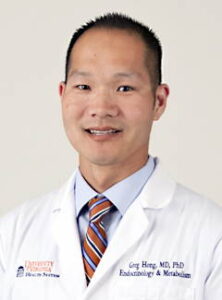
Dr. Hong completed undergraduate studies at the University of California San Diego and then joined the Medical Scientist Training Program at the University of North Carolina, Chapel Hill, where he pursued graduate studies examining the role of the Epstein-Barr virus in driving tumorigenesis of lymphoid cells. Upon completing his medical degree, he then came to the University of Virginia, where he completed residency training in Internal Medicine and an Endocrinology & Metabolism fellowship. He joined the Division of Endocrinology as an Assistant Professor in 2013 and was promoted to Associate Professor in 2020. His primary clinical interest is pituitary disease, and he is a member of UVA’s nationally recognized Multidisciplinary Pituitary Tumor Program. He received the Department of Medicine’s Excellence in Clinical Care Award. In addition to his work in the Pituitary Tumor Program, Dr. Hong has demonstrated an outstanding commitment to trainee education. He has created numerous educational materials at both the local and national levels while spending significant time precepting medical students, residents, and fellow trainees in various settings. He received the Department of Medicine Inpatient Attending of the Year award in 2017 and the Department of Medicine Excellence in Teaching award in 2018. He was subsequently inducted into the Academy of Distinguished Educators in 2019. On the national level, he serves on the Endocrine Society’s Clinical Education Committee (where he is the co-chair of the Endocrine Educators Forum committee). He has been heavily involved in the Association of Program Directors of Endocrinology & Metabolism (currently serving as Secretary/Treasurer, as well as Co-Chair of the Fellowship Recruitment Committee, and previously served on the governing council from 2022-2024).
Since joining the division, Dr. Hong has been heavily involved in fellow education. He formally assumed the role of Associate Program Director in 2019 and assumed the position of Program Director in July 2020.
Email: gkh7z@virginia.edu
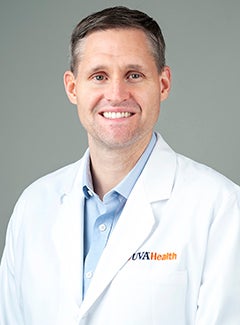 William (Ben) Horton, MD (Assistant Professor of Medicine)
William (Ben) Horton, MD (Assistant Professor of Medicine)
Associate Program Director
Dr. Horton completed medical school and Internal Medicine residency training at the University of Mississippi. He subsequently completed fellowship training in Endocrinology and Metabolism at UVA (2016-2019) and has remained on faculty ever since. Dr. Horton’s research interests relate to the cardiovascular complications (specifically heart failure) of type 1 diabetes, along with investigating potential treatments that may reduce such complications in this patient population. Dr. Horton is also committed to medical education and was a member of the ACGME Endocrinology, Diabetes, and Metabolism Milestones 2.0 Work Group, which created the updated trainee milestones now used in nationwide fellowship training programs. Dr. Horton assumed our fellowship training program’s Associate Program Director role in 2024.
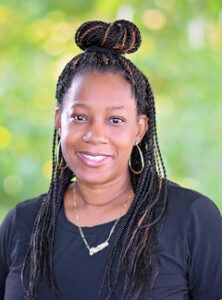 Javanov Barksdale
Javanov Barksdale
Fellowship Program Coordinator
Contact information:
Box 801406, UVAHS, Charlottesville, VA 22908
Phone: 434.243.8482
Email: jcb8qt@virginia.edu
Javanov Barksdale has been with the University of Virginia for fourteen years and the Department of Medicine for the last five years. She says that the best part of being Fellowship Coordinator is the interaction she gets to have with the Fellows. She often tells the fellows, “This is a partnership.” She values having the opportunity to help others achieve their goals during their time at UVA.
When Javanov is not working, she enjoys spending time with her family and friends. She belongs to an awesome workout group; her guilty pleasure is purses.
Endocrinology Clinical Case Conference (12:00–1:00 pm Tues, Aug through June): Fellows present two clinical cases to the faculty. This is a teaching conference where pathophysiology, diagnostic considerations (e.g., technical aspects of hormone assays), approaches to management, and relevant literature are routinely discussed.
Endocrinology and Metabolism Grand Rounds (1:00–2:00 pm Tues, Aug through June): State-of-the-art lectures by internal and external speakers on clinical and scientific topics. Each fellow also presents a clinical and/or research topic once a year.
Fellows’ Didactic (Clinical Lecture) Series (2:00–3:00 Tues*). Faculty give didactic lectures on a wide variety of topics. The lecture topics are carefully planned to ensure all relevant topics in endocrinology are covered. *Of note, during the month of July, didactic lectures also occur from 12:00-3:00 pm where “Crash Course” lectures are given to quickly orient & educate incoming fellows on common inpatient endocrine problems).
Thyroid Cancer Case Conference (4:00–5:00 pm every other Tues): Faculty and fellows from Endocrinology, Radiology/Nuclear Medicine, Pathology, and Surgery/Otolaryngology-Head and Neck Surgery discuss complicated thyroid cancer cases. The primary goal is clinical decision-making in a multidisciplinary setting.
Pituitary Case Conference (7:45–8:45 am, 3rd Friday of the month): Details regarding 5-6 pituitary cases are discussed by faculty/fellows from Endocrinology, Neurosurgery, Neuroradiology, and Neuropathology.
Journal Club (1h every other month, on an evening, usually at a faculty member’s house w/refreshments or a local restaurant): Fellows and a faculty member review a recent scientific publication, focusing on methods (e.g., study design, statistical analysis) and clinical relevance.
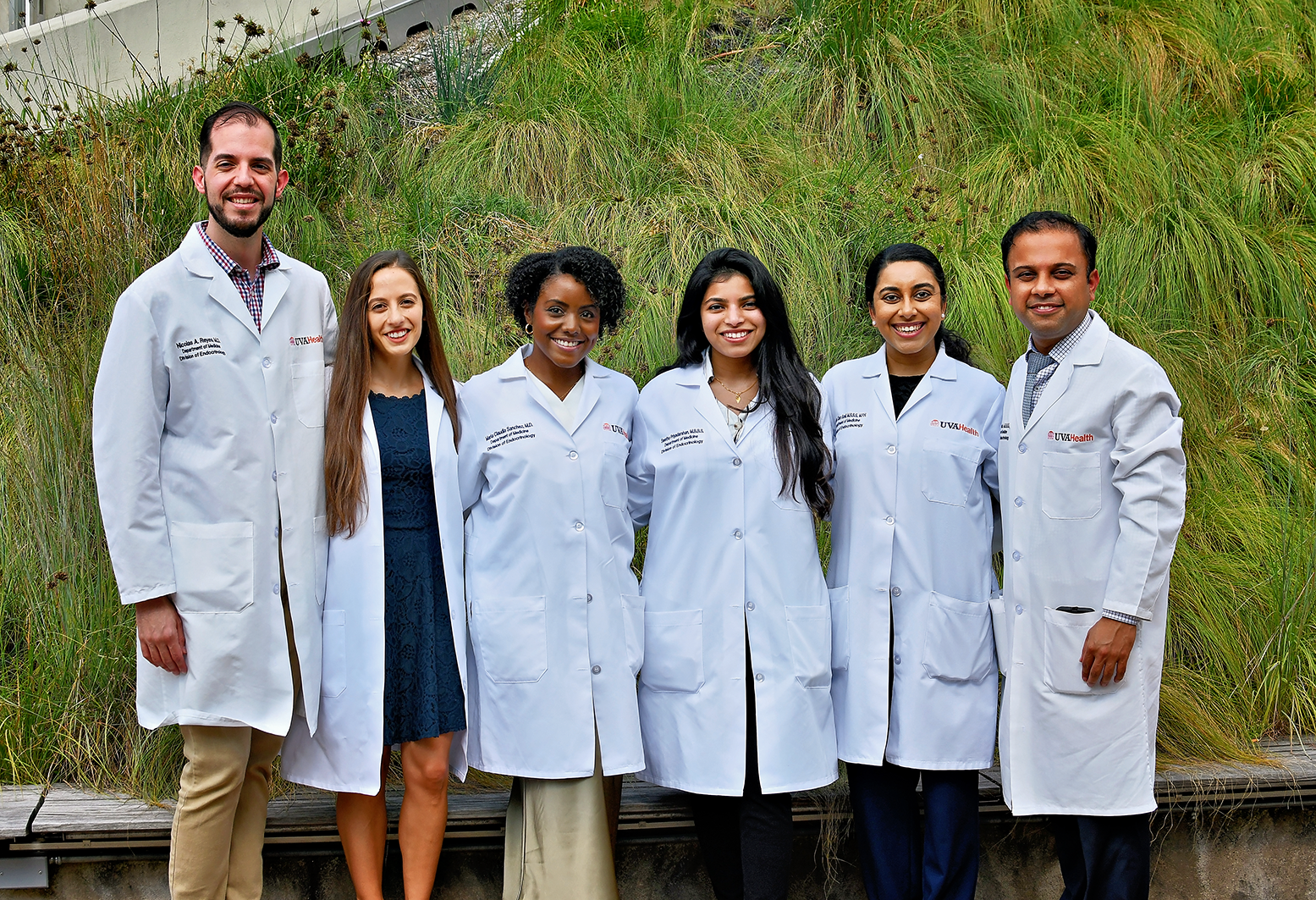
2024/2025 Fellows, from left: Nicolas Reyes, Melisa Esposito, Maria Sanchez, Swetha Priyadarshan, Roselind Basil, Amrit Pathak
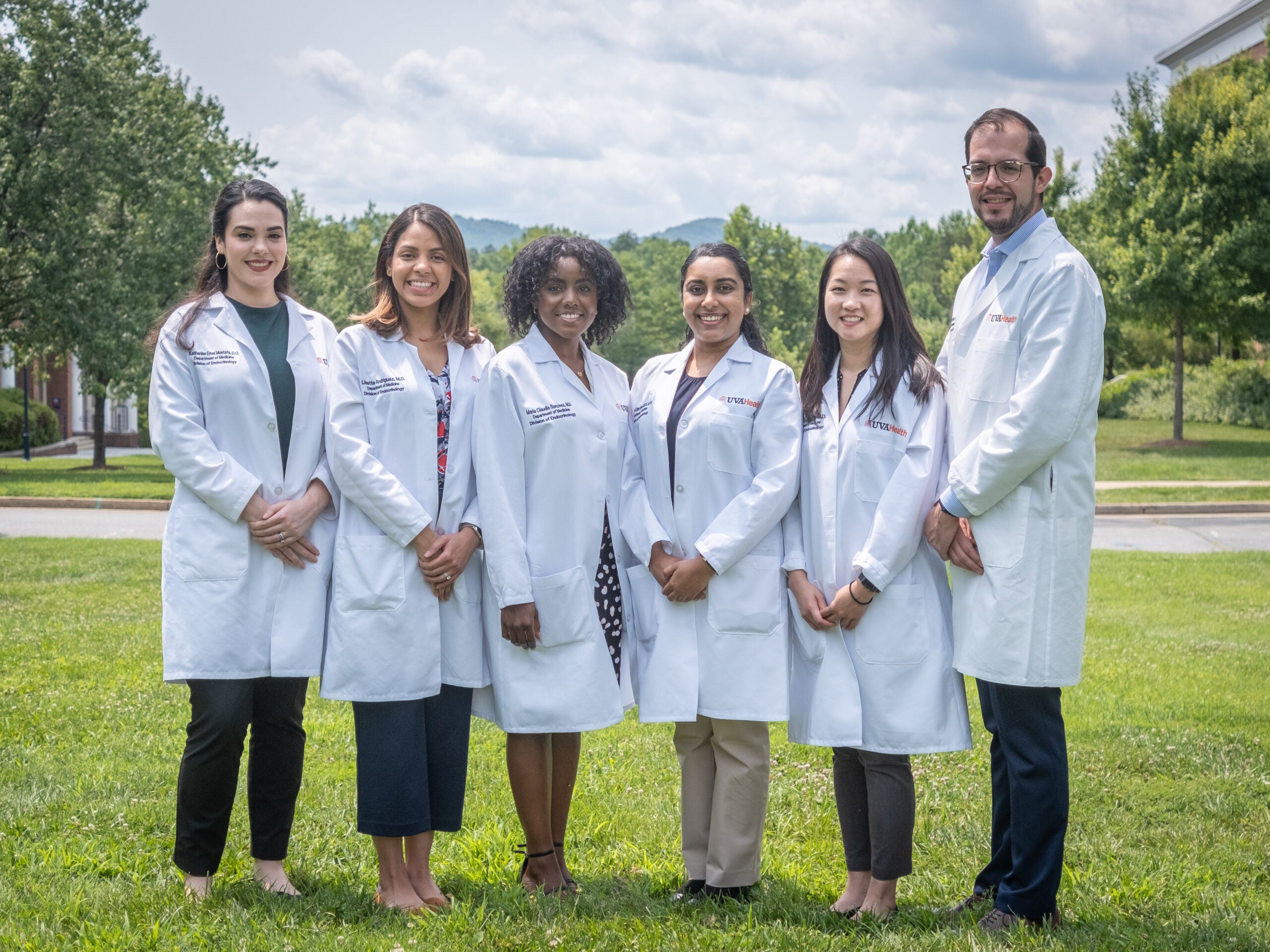
2023-2024 Fellows from left: Kat Mustafa, Angela Vuong, Maria Sanchez, Rosalind Basil, Lisette Rodriguez, Nicolas Reyes
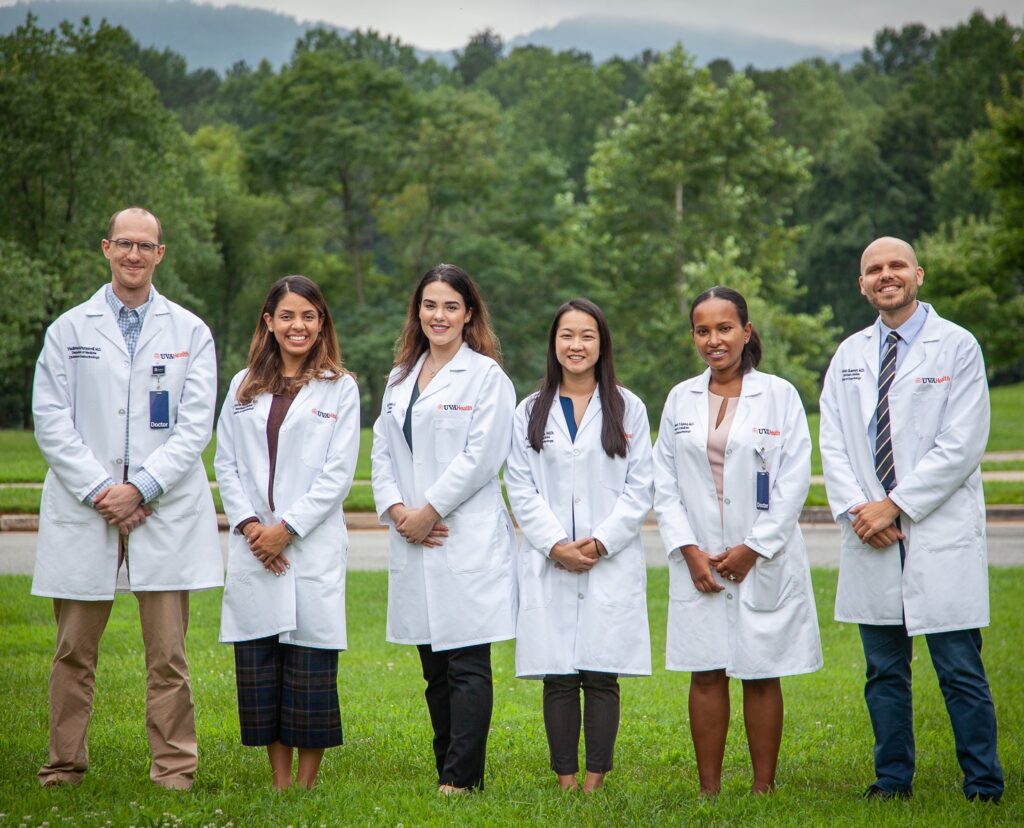
2022-2023 Fellows (L to R): Vladimer (Lado) Bakhutashvili, Lisette Rodriguez, Katherine (Kat) Mustafa, Angela Vuong, Woderyelesh (Woder) Kassa, Nawar Suleman
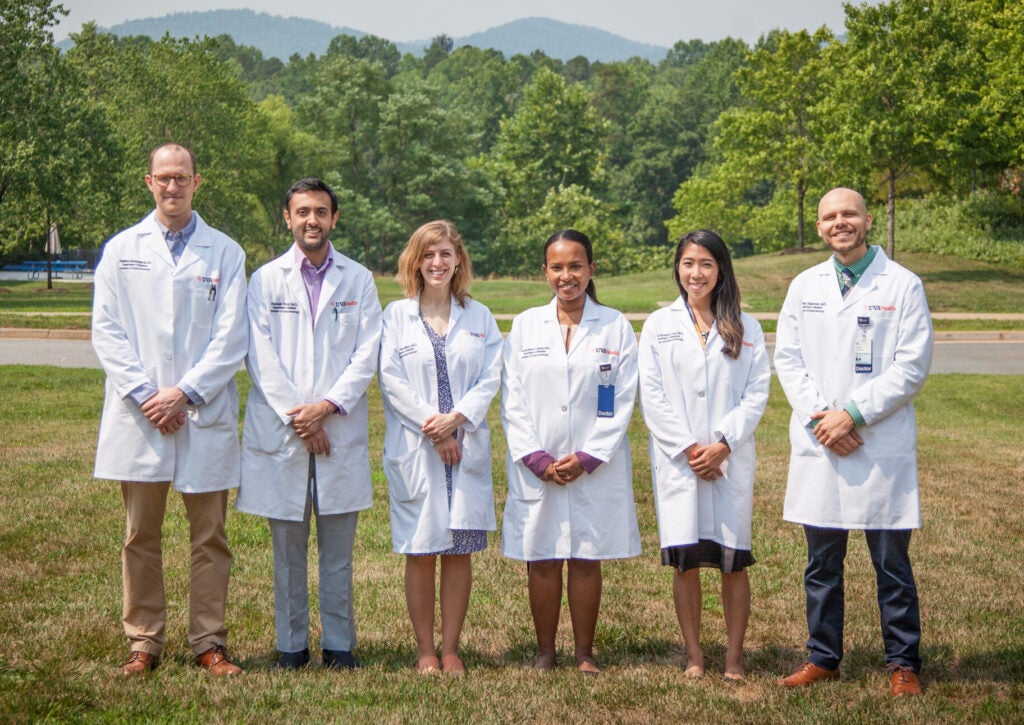
2021-2022 fellows (left to right): Vladimer (Lado) Bakhutashvili, Ronak Patel, Janice McMillan, Woderyelesh (Woder) Kassa, Sarah Lee, Nawar Suleman
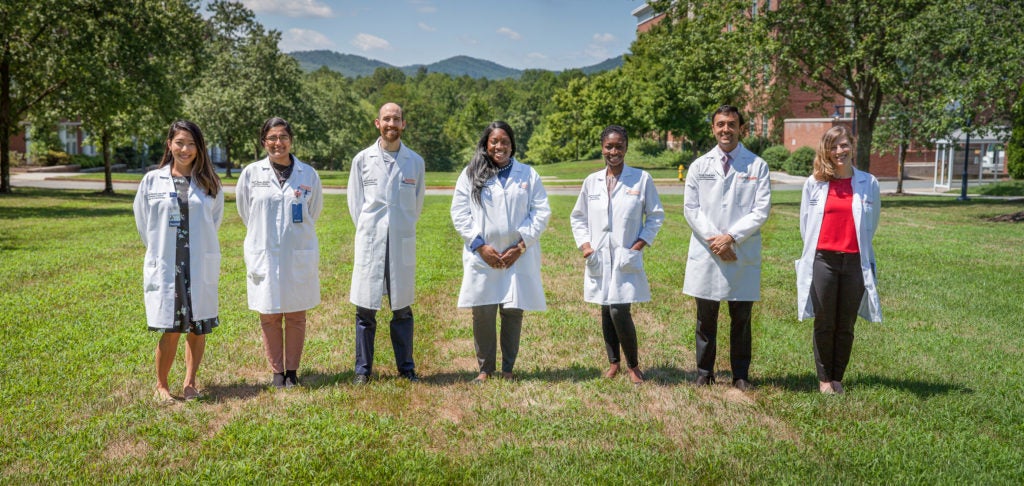
2020-2021 fellows (left to right): Sarah Lee, Izzah Vasim, Jeremy Steinman, Jeanette Owusu, Peggy Amoakohene, Ronak Patel, Janice McMillan
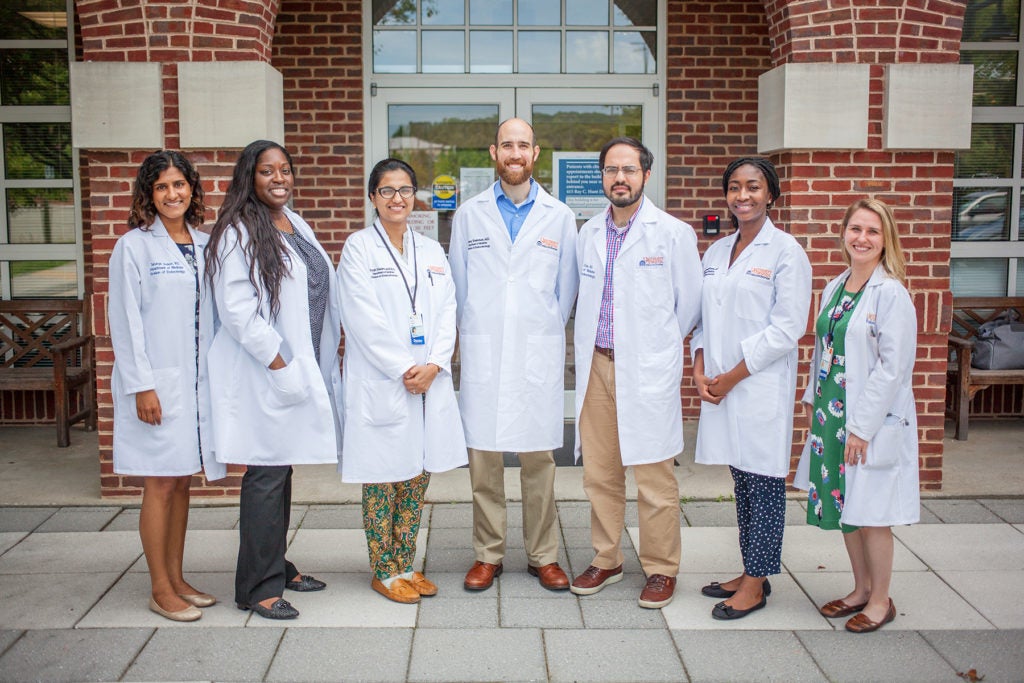
2019-2020 fellows (left to right): Tarunya Vedere, Jeanette Owusu, Izzah Vasim, Jeremy Steinman, Suhail Dar, Peggy Amoakohene, Kaitlin Love.
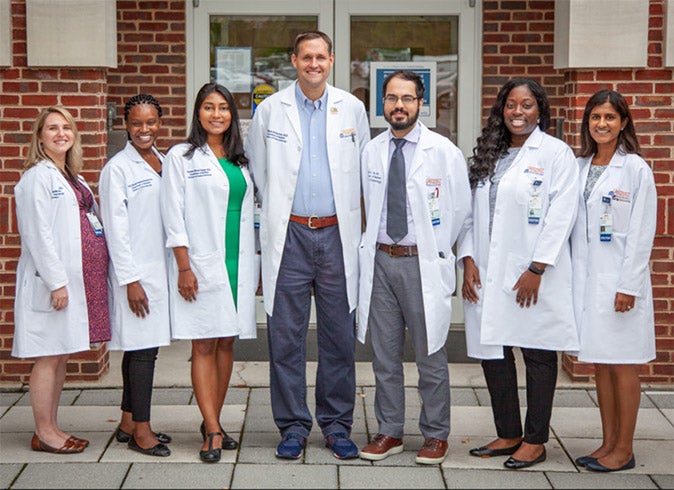
2018-2019 fellows (left to right): Kaitlin Love, Charity Kwamanakweenda, Nyrene Haque, William Benjamin (Ben) Horton, Suhail Dar, Jeanette Owusu, Tarunya Vedere.

2017-2018 Endocrinology Fellows (left to right): Kaitlin Love, Charity Kwamanakweenda, Nyrene Hague, Ben Horton, Meaghan Stumpf, Jessica Lundgren, Shreela Mishra.

2016-2017 Endocrinology Fellows (left to right): Silas Culver, Shakaria Johnson, Jessica Lundgren, Su Hee Kim, Shreela Mishra, Lihong Huo, Meaghan Stumpf, Samer Hafi, Ben Horton.
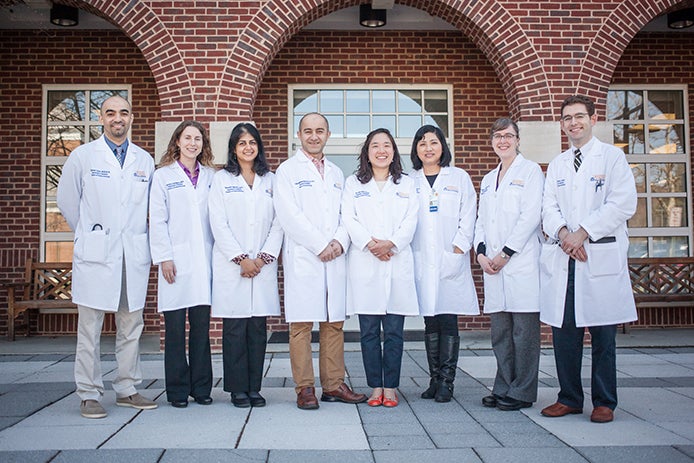
2015-2016 Endocrinology Fellows (left to right): Samer Hafi, Jessica Lundgren, Shreela Mishra, Farhad Hasan, Su Hee Kim, Lihong Huo, Eleanor Hutchens, Silas Culver.
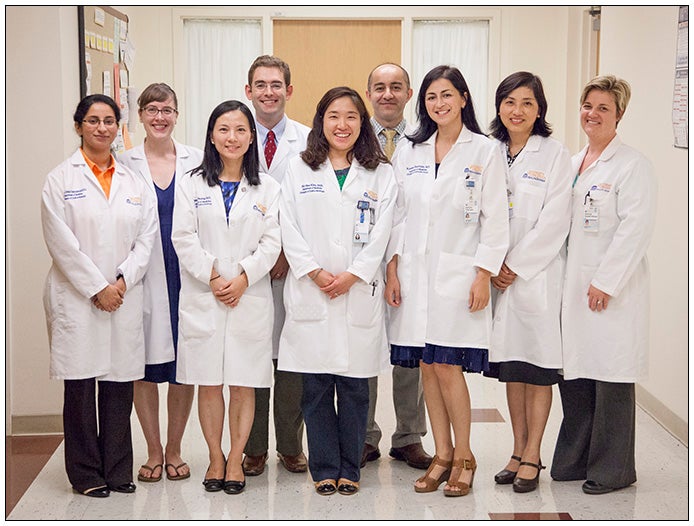
2014-2015 Endocrinology Fellows (left to right): Ramya Embar Srinivasan, Eleanor Hutchens, Wenyan Huang, Silas Culver, Su Hee Kim, Farhad Hasan, Katarina Topchyan, Lihong Huo, and Mandy Kleiner.
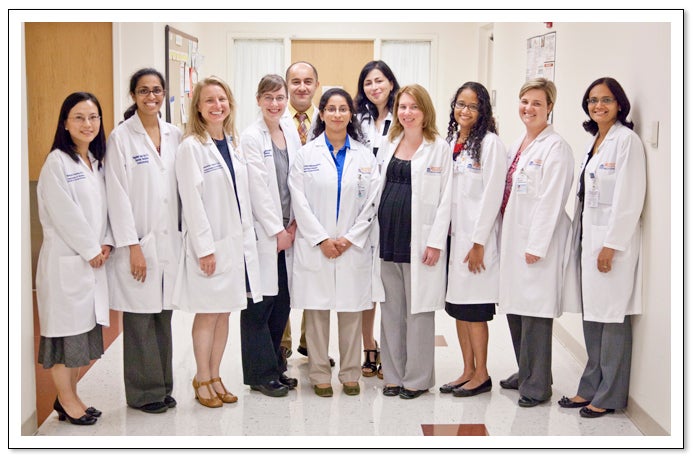
2013-2014 Endocrinology Fellows (left to right): Wenyan Huang, Shree Gundu Rao, Jennifer Gibert, Eleanor Hutchens, Farhad Hasan, Ramya Embar Srinivasan, Katarina Topchyan, Amy Anderson, Sharmila Subaran, Mandy Kleiner, and Ruchi Bhabhra.
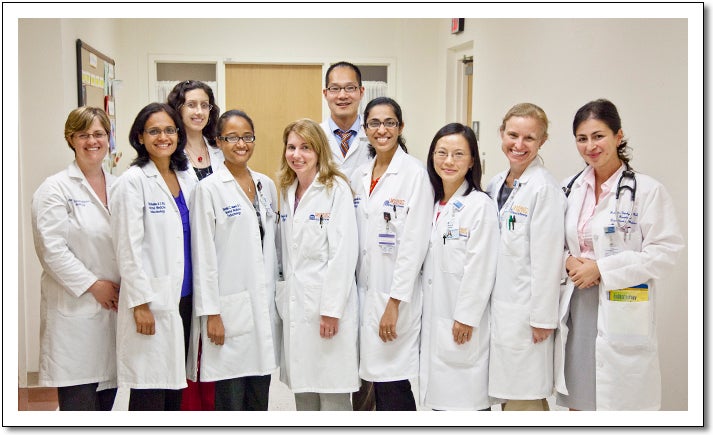
2012-2013 Endocrinology Fellows (left to right): Mandy Kleiner, Ruchi Bhabhra, Cristina Gherghe, Sharmila Subaran, Amy Anderson, Greg Hong, Shree Gundu Rao, Wenyan Huang, Jennifer Gibert, and Katarina Topchyan.
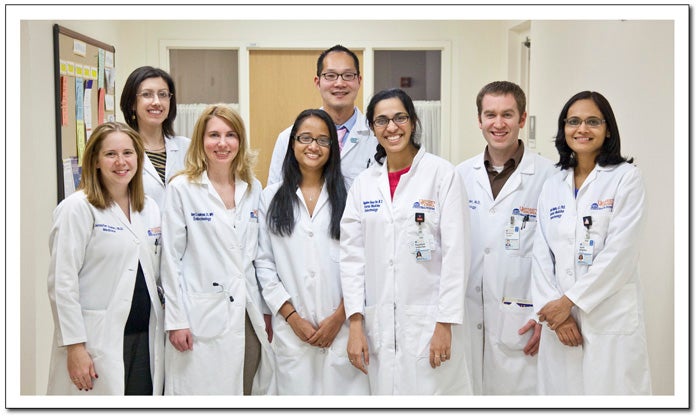
2011-2012 Endocrinology Fellows (left to right): Jen Beller, Cristina Gherghe, Amy Anderson, Sharmila Subaran, Greg Hong, Shree Gundu Rao, Matt Sauder, and Ruchi Bhabhra.
Learn More About UVA and Charlottesville
Links and videos to help you learn more about our program, UVA, and the Charlottesville area
Welcome to the Fellowship Program in Endocrinology and Metabolism at the University of Virginia! These web pages contain an overview of our training program, available clinical and research facilities, and our program leadership.
If you are interested in a fellowship position, please see the dedicated section on “Application Information” for detailed specifics.
2025 fellowship recruitment (for positions starting July 2026): In accordance with recommendations from national organizations (AAMC, AAIM, and Association of Program Directors in Endocrinology/Metabolism), all fellowship interviews will be 100% virtual for the 2025 recruitment season. Full details of the recommendations from the Association of Program Directors in Endocrinology/Metabolism are at this link.
Our UVA Endocrinology Fellowship Program participates in Program Signaling and preferentially reviews applications from those who signal our program. However we also consider applicants who do not signal us, and use an overall holistic application review in determining whom to extend interview invites to.

2024/2025 Fellows, from left: Nicholas Reyes, Melisa Esposito, Maria Sanchez, Swetha Priyadarshan, Roselind Basil, Amrit Pathak
Congratulations 2024 graduates!

Learn More About UVA and Charlottesville
Links and videos to help you learn more about our program, UVA, and the Charlottesville area
